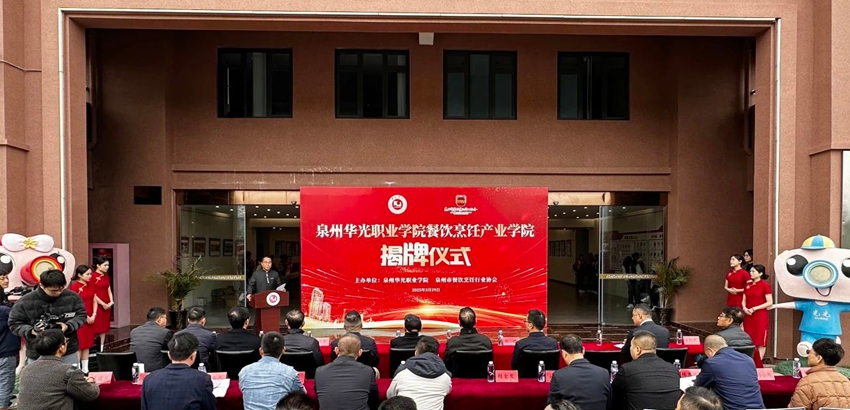- Updates
- News
On March 29, Quanzhou Huaguang Vocational College and the Quanzhou Culinary and Catering Industry Association officially inaugurated the Culinary Industry Academy at the college's Huian campus. This milestone initiative aims to strengthen industry-education integration and elevate the training of culinary professionals in Quanzhou.

A Dual-Track Model for Culinary Talent Development
The Culinary Industry Academy adopts a dual-track training model, where the industry association and the college collaboratively design programs. This partnership extends to curriculum development, hands-on training facilities, and industry integration, with leading catering enterprises actively involved in practical instruction.
Starting in fall 2025, Quanzhou Huaguang Vocational College will introduce a new major in Culinary Arts and Nutrition under the academy. The curriculum will focus on Quanzhou cuisine, incorporating modern culinary technology, food and health sciences, and smart kitchen innovations. This initiative provides students with a three-dimensional learning experience—blending classroom instruction, kitchen practice, and real-world industry exposure—while reinforcing the government-industry-business-education collaboration model.
By leveraging both educational resources and industry expertise, the academy fosters deep industry-academia-research integration to develop highly skilled professionals aligned with the evolving needs of the modern food service industry.
Addressing Industry Demands with Skilled Culinary Professionals
According to Liu Shuwen, President of the Quanzhou Culinary and Catering Industry Association, China's food service sector continues to expand, with total dining revenue reaching RMB 5.6 trillion in 2024, reflecting a 5.3% year-on-year increase. With nearly 8 million dining establishments nationwide, the demand for highly trained chefs—especially those with professional expertise—has never been greater.
To meet this growing need, the academy aims to train a new generation of chefs who:
Master traditional culinary techniques
Apply scientific cooking principles
Innovate with modern culinary advancements
Adapt to smart kitchen technologies
Demonstrate creativity and entrepreneurial skills
Wu Qicui, Honorary Chairman of Quanzhou Huaguang Vocational College, emphasized that the academy will serve as a hub for hands-on training and skills enhancement. The college is also developing the Min-Tai Smart Leisure Farm, which will support sustainable agriculture and provide essential resources for the academy's expansion. Moving forward, the institution will deepen industry-education collaboration, ensuring a steady pipeline of highly skilled professionals to sustain and innovate Quanzhou's rich culinary heritage.
Strengthening Industry-Academia Collaboration for Culinary Innovation
Experts highlight this partnership between Huaguang Vocational College and the Quanzhou Culinary and Catering Industry Association as a model for industry-education collaboration. By integrating curriculum development, hands-on training, and employment incubation, the academy ensures a seamless transition between vocational education and industry workforce needs. This initiative not only bridges the gap in culinary education but also drives the transformation and upgrading of Quanzhou's food service sector.
A representative from the Quanzhou UNESCO Creative Cities Office emphasized that the launch of the Culinary Arts and Nutrition major addresses a long-standing gap in Quanzhou's higher education landscape. Since July 2023, Quanzhou has actively pursued recognition as a UNESCO Creative City of Gastronomy, with culinary talent development as a core priority.
In December 2023, the city introduced measures to strengthen its culinary workforce, incorporating culinary-related programs into the 2025 Higher Education Curriculum Guide and promoting joint industry-academia training institutes. The next phase of this initiative includes:
Developing a digital culinary education platform and a heritage culinary database
Launching tiered public culinary training programs at institutions such as the Quanzhou Youth Palace and Quanzhou Elderly University
Establishing an off-campus education base at the Quanzhou Food Culture Museum
Organizing "Master Chefs in Schools" programs and industry-focused campus recruitment fairs
Creating a dual-instructor talent pool to support university-enterprise cooperation
This pioneering model sets a precedent for broader industry involvement in vocational education, fostering a sustainable cycle between education, talent development, and industry growth. It also provides essential human capital and innovation support as Quanzhou continues its journey toward becoming a UNESCO Creative City of Gastronomy.
